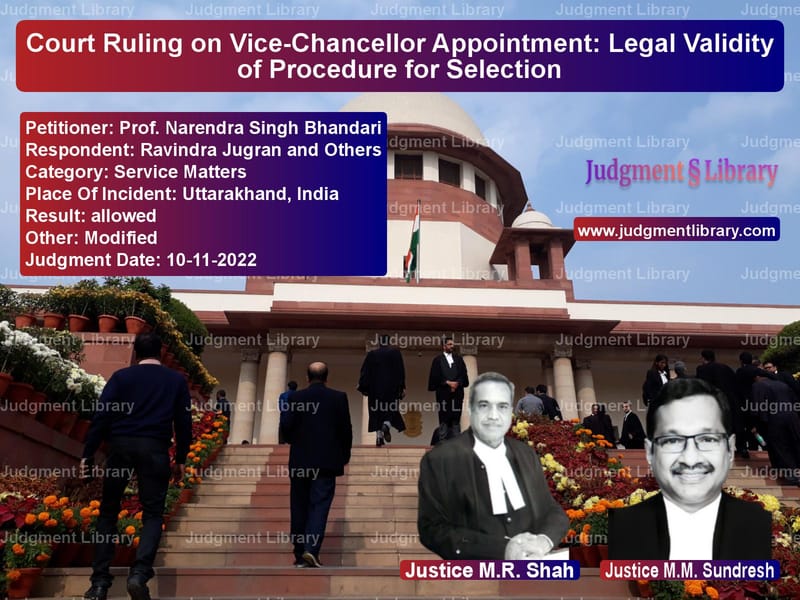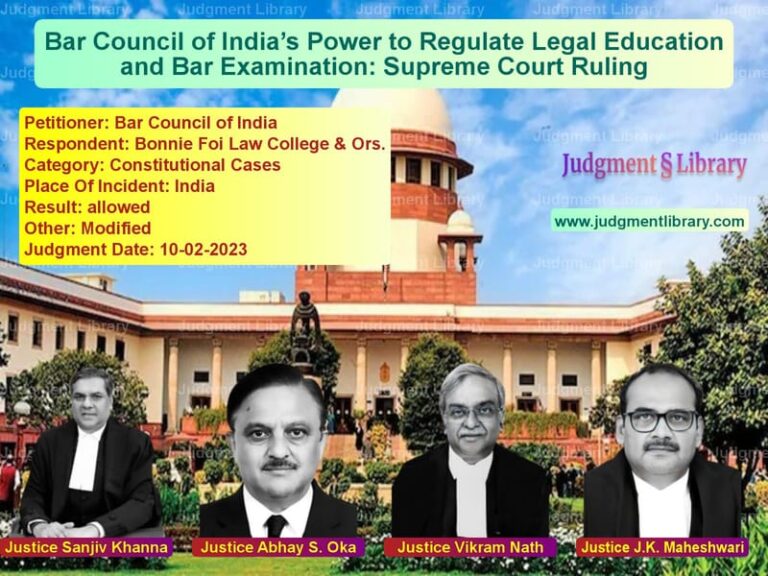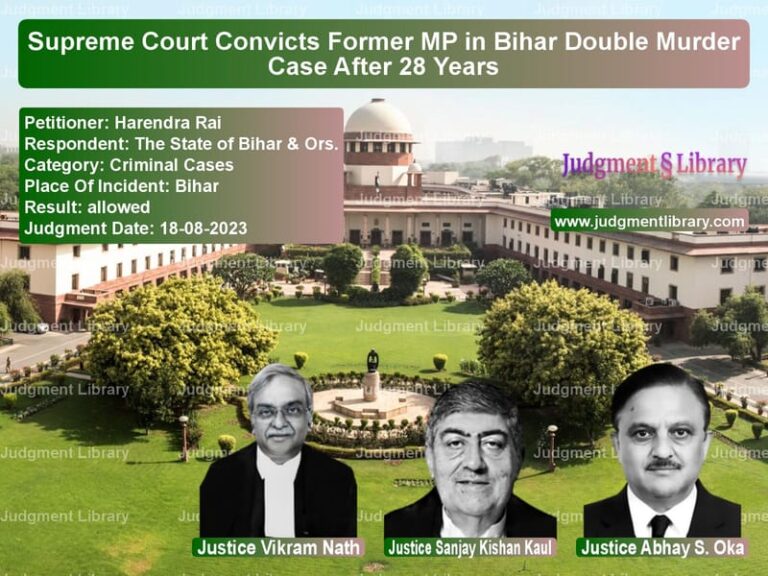Court Ruling on Vice-Chancellor Appointment: Legal Validity of Procedure for Selection
The Supreme Court of India recently ruled on a critical case, Prof. Narendra Singh Bhandari v. Ravindra Jugran and Others, regarding the appointment of a Vice-Chancellor at Soban Singh Jeena University in Uttarakhand. The appellant, Prof. Narendra Singh Bhandari, challenged the decision of the Uttarakhand High Court that quashed his appointment as Vice-Chancellor of the University, arguing that the appointment process followed was not in compliance with statutory requirements.
Background of the Case
Prof. Bhandari was appointed as the first Vice-Chancellor of Soban Singh Jeena University on 11th August 2020. However, the appointment was challenged by the respondent, Ravindra Jugran, who filed a writ petition before the High Court. The challenge was based on the argument that Prof. Bhandari did not meet the eligibility criteria under the University Grants Commission (UGC) Regulations, 2018, which mandated a minimum of 10 years of experience as a professor in a university. The respondent also claimed that the process of selection did not follow the prescribed procedure, particularly the requirement for the Search Committee to recommend the candidate.
Read also: https://judgmentlibrary.com/supreme-court-upholds-uttarakhands-policy-on-b-ed-college-recognition/
Petitioner’s Arguments
The appellant, Prof. Bhandari, argued that:
- The UGC Regulations, 2018, had been adopted by the State Government with modifications, which allowed for flexibility in the appointment of the first Vice-Chancellor of the University.
- The requirement for 10 years of teaching experience as a professor should not be strictly applied as he had more than 8 years of experience and had been on long leave as a member of the Uttarakhand Public Service Commission.
- Even while serving as a member of the Public Service Commission, he continued his academic activities by supervising PhD scholars, which should be considered as teaching experience.
- The State Government, in its capacity as the appointing authority, had exercised its discretion to appoint him based on his academic credentials and experience, and there was no requirement for a Search Committee for the first Vice-Chancellor.
Respondent’s Arguments
The respondent, Ravindra Jugran, argued that:
- The appointment violated the UGC Regulations, 2018, as Prof. Bhandari did not have the requisite 10 years of teaching experience.
- The process of selection was flawed as the Search Committee did not recommend the appellant’s name, nor was the position advertised as required by the UGC Regulations.
- Being a member of the Public Service Commission, Prof. Bhandari could not be considered to have acquired teaching experience, and supervising PhD scholars could not be equated to formal teaching.
- Therefore, his appointment was illegal, and the High Court was correct in setting aside the appointment.
Supreme Court’s Observations
The Supreme Court reviewed the arguments presented and made the following key observations:
- The Court noted that the UGC Regulations, 2018, set a clear standard for the appointment of a Vice-Chancellor, which included having 10 years of teaching experience as a professor.
- However, the Court also recognized that the UGC Regulations were adopted by the State Government with modifications, and it was permissible for the State to appoint the first Vice-Chancellor with some flexibility in the process.
- The Court further acknowledged that while Prof. Bhandari did not strictly meet the 10-year teaching requirement, his academic qualifications, administrative experience, and contributions to the field were notable and should be considered in light of the appointment being the first for the University.
- Regarding the process, the Court highlighted that the appointment of the first Vice-Chancellor under Section 10 of the University Act, 2019, could be made by the State Government without the necessity of the Search Committee’s recommendation, as per the proviso to Section 10(1).
- Nevertheless, the Court also emphasized the importance of following the prescribed procedures and ensuring that the merit of candidates is assessed properly through a Search Committee process.
Supreme Court’s Verdict
The Supreme Court, after examining the facts and legal provisions, concluded:
- “We find that the High Court’s decision to quash the appointment was based on a strict interpretation of the UGC Regulations, without taking into account the flexibility allowed by the University Act, 2019 for the first Vice-Chancellor.”
- “The appointment of Prof. Bhandari, though flawed in procedure, is not unconstitutional or without merit. However, the process needs to be re-evaluated for future appointments to ensure full compliance with the law.”
- “The appellant may continue in the role of Vice-Chancellor, but for future appointments, the proper Search Committee process must be followed.”
The Court thus allowed the appellant’s appeal and restored his appointment as Vice-Chancellor, but made it clear that in the future, the appointment process must strictly adhere to the regulations.
Key Takeaways from the Judgment
- Flexibility in Appointing the First Vice-Chancellor: The Court recognized that the first Vice-Chancellor of a newly established university can be appointed with some flexibility, but future appointments must follow the prescribed process.
- Importance of Search Committees: The judgment reinforced the need for a Search Committee to evaluate candidates for the post of Vice-Chancellor to ensure transparency and merit-based appointments.
- Interpretation of Teaching Experience Requirements: While the teaching experience requirement under UGC Regulations was not strictly applied, the Court emphasized that administrative duties and contributions to the academic field could also be considered.
- Role of the State in University Appointments: The Court highlighted the role of the State Government in appointing the first Vice-Chancellor but reiterated that future appointments must be made with a more structured selection process.
Implications of the Judgment
This ruling has significant implications for university governance in India, particularly in the context of Vice-Chancellor appointments:
- It sets a precedent for the appointment of the first Vice-Chancellor of a university, emphasizing the need for flexibility but also ensuring that due process is followed in future appointments.
- It reinforces the importance of using Search Committees for high-level university appointments to ensure fairness, transparency, and meritocracy.
- It highlights the Court’s role in balancing legal regulations with the practicalities of administrative decisions in university governance.
Conclusion
The Supreme Court’s decision in Prof. Narendra Singh Bhandari v. Ravindra Jugran and Others affirms the importance of following proper procedures for appointing Vice-Chancellors and other high-ranking officials at universities. While the Court allowed the appellant to retain his position as Vice-Chancellor, it made it clear that future appointments should strictly adhere to the UGC Regulations and the University Act, 2019. This ruling serves as a reminder of the significance of ensuring transparency and fairness in the selection process for academic leadership positions.
Petitioner Name: Prof. Narendra Singh Bhandari.Respondent Name: Ravindra Jugran and Others.Judgment By: Justice M.R. Shah, Justice M.M. Sundresh.Place Of Incident: Uttarakhand, India.Judgment Date: 10-11-2022.
Don’t miss out on the full details! Download the complete judgment in PDF format below and gain valuable insights instantly!
Download Judgment: prof.-narendra-singh-vs-ravindra-jugran-and-supreme-court-of-india-judgment-dated-10-11-2022.pdf
Directly Download Judgment: Directly download this Judgment
See all petitions in Employment Disputes
See all petitions in Public Sector Employees
See all petitions in Recruitment Policies
See all petitions in Contractual Employment
See all petitions in Judgment by Mukeshkumar Rasikbhai Shah
See all petitions in Judgment by M.M. Sundresh
See all petitions in allowed
See all petitions in Modified
See all petitions in supreme court of India judgments November 2022
See all petitions in 2022 judgments
See all posts in Service Matters Category
See all allowed petitions in Service Matters Category
See all Dismissed petitions in Service Matters Category
See all partially allowed petitions in Service Matters Category







